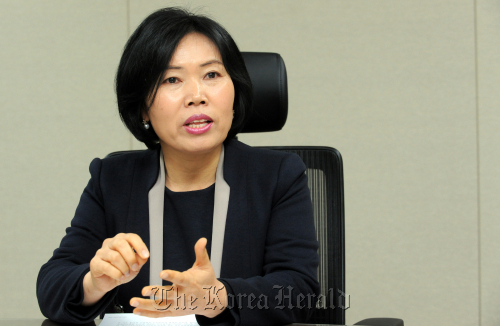Expert says ruling elite favors status quo, but reform inevitable for economyKim Young-hui, a North Korean defector working here as a researcher on the communist state’s economy, believes any big change there is inconceivable for now as the power elites want to preserve the status quo to maintain their vested interests.
Kim of the state-owned Korea Finance Corporation also said that a wave of democratic movements in the Middle East and North Africa would hardly affect the tightly controlled country.
“It would be a mistake if you think there would be any confusion with the change of the leadership. When the regime collapses, power elites would lose their vested interests. Thus, they remain loyal to their leader,” Kim told The Korea Herald.
“The leader and the elites are inseparable as they feed their families for generations while staying loyal to their leader. The regime also educates them about how the elites lost their vested interests when their East European socialist countries collapsed.”
Kim, now 47, crossed the border with China with her husband, mother-in-law and two sons across the Tumen River in August 2002. She then entered the South via Mongolia in December of the same year.
She followed her husband’s decision to defect after he had been under much stress as he could not continue to rise up the social ladder due to the fact that he had some relatives in China. The regime has shunned people with relatives in China or South Korea in efforts to block outside information from flowing in.
Since graduating from an economy university in the eastern coastal city of Wonsan in 1990, she had worked as an accounting staff at a state corporation in the North. Before joining the KOFC in August 2010, she worked as a researcher at the Korea Development Bank for more than three years.
Kim repudiated the claim by some experts here that some power elites could challenge Kim Jong-un, the inexperienced and untested leader in his late 20s.
But she said unlike his father Kim Jong-il, Jong-un would have to solicit opinions of the power brokers such as Jang Song-thaek, vice chairman of the state National Defense Commission. Jang is the husband of Kim Jong-il’s younger sister Kyong-hui.
“In the North, it is impossible for someone who doesn’t belong to the Kim dynasty to become an official leader as it simply runs counter to its hereditary revolutionary succession principle,” she said.

Kim Young-hui, a researcher on the North Korean economy at the state-owned Korea Finance Corporation, speaks in Seoul on Thursday. (Ahn Hoon/The Korea Herald)
“As he is young and has little experience, he would listen to more voices from the elites to make decisions on state affairs. The influence of the elites could grow in the process and Jong-un could become a mere symbolic head later, though he would continue to hold the throne.”
As his father, who reportedly died of a heart failure in December, has given North Koreans a “ideologically and militarily strong nation,” what Jong-un is responsible for would be economic advancement, Kim said.
“To this end, adopting reform measures and an openness policy would be inevitable. I predict that the leader could give more autonomy in the operation of state firms and increase the number of special economic zones,” she said.
“The North doesn’t like to imitate someone else’s model. So rather than adopting the exact replica of the Chinese economic model, I believe the North would create its own model that would adopt some features of the Chinese model.”
She added that some signs of economic reforms in the North have already been detected.
One of them is that last year, former vice premier Park Bong-ju returned to the center of the administration. Park who had been at the vanguard of economic reforms was relegated in 2006 reportedly by military leaders with grudges against him.
Touching on the Arab Spring, Kim said it is out of the question in the Hermit Kingdom given that government minders covertly operate in every nook and corner.
“Most North Koreans don’t know what the Jasmine Revolution is and who is the president in Libya. The monitoring system in the North is also very horrible. After chatting with some of your friends, you would find the next day that one of them was a government informer reporting to the state security staff,” Kim said.
“That is why we say there is an ear in the wall. Who would dare to cause any revolt or come forward to form any opposition and dissident groups when the result is that (the lives of) three generations of their families are seriously endangered.”
Under the new leadership, there would be some change, but not any significant changes to the North’s foreign policy this year when many nations including the U.S., China, Russia and South Korea will undergo leadership changes or elections.
“While carefully watching the developments in the U.S., Russia, China and South Korea, the new leadership in the North would take time to reflect on its past foreign policy and design a new one,” Kim said.
“There would be some change anyway several years down the road as people have expectations on the new leader. The expectation is based on a glimmer of hope for change as the new leader can do something different given that he is young and received education in a foreign country.”
By Song Sang-ho (
sshluck@heraldcorp.com)






